春节的来历与习俗的英语介绍大全
春节的由来英语

春节的由来英语春节的由来英语 每逢春节来临,⼈们就有了⼀周的休息时间,不管家离得有多远,都会回家过年。
你们对春节的来历和习俗有多少的了解吗?以下是由yjbys⼩编为⼤家收集整理的英语春节的由来,欢迎⼤家学习参考。
⼀、春节来历的英⽂介绍 Origin of the Spring Festival Spring Festival is the lunar Suishou,is also our ancient traditional festivals.Ancient-off "year"is not in the twelfth lunar month on the 29th or on the 30th,but in the "wax on",that later,"Laba."Southern and Northern Dynasties later,the "wax Festival"to the end of the year.To the Republican era,the switch to Gregorian calendar was only then that the lunar year is called "Spring Festival",because the Spring Festival is generally in the "Spring,"both before and after. 翻译:春节,是农历的岁⾸,也是我国古⽼的传统节⽇.古代过“年”不是在腊⽉⼆⼗九⽇或三⼗⽇,⽽是在“蜡⽇”,即后来的“腊⼋”.南北朝以后,把“蜡祭”移⾄岁末.到了民国时,改⽤阳历,才把阴历年叫“春节”,因为春节⼀般都在“⽴春”前后。
Spring Festival is China's biggest and most exciting festival of an ancient monly known as "Chinese New Year."According to China's Lunar New Year,the first month who started in ancient times known Mongol Yuan Chen,Yuan-cheng,Yuan Shuo,New Year's Day and so on,commonly known as New Year's Day,as well as the previous day,moving in,three new moon,three North Korea,the three began,ternary,etc.Do not say,which means the first month who started this is the year,month,day three start. 翻译:春节是我国最盛⼤、最热闹的⼀个古⽼传统节⽇。
关于春节的来历英语作文加翻译
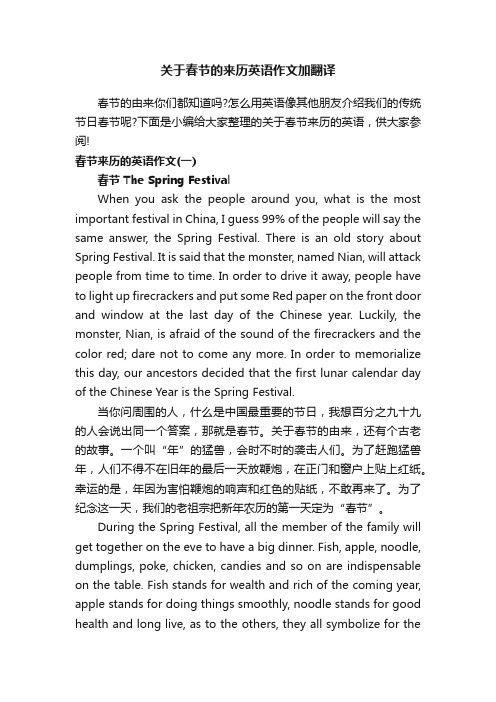
关于春节的来历英语作文加翻译春节的由来你们都知道吗?怎么用英语像其他朋友介绍我们的传统节日春节呢?下面是小编给大家整理的关于春节来历的英语,供大家参阅!春节来历的英语作文(一)春节 The Spring FestivalWhen you ask the people around you, what is the most important festival in China, I guess 99% of the people will say the same answer, the Spring Festival. There is an old story about Spring Festival. It is said that the monster, named Nian, will attack people from time to time. In order to drive it away, people have to light up firecrackers and put some Red paper on the front door and window at the last day of the Chinese year. Luckily, the monster, Nian, is afraid of the sound of the firecrackers and the color red; dare not to come any more. In order to memorialize this day, our ancestors decided that the first lunar calendar day of the Chinese Year is the Spring Festival.当你问周围的人,什么是中国最重要的节日,我想百分之九十九的人会说出同一个答案,那就是春节。
关于春节的来历与习俗的英语介绍(附翻译)
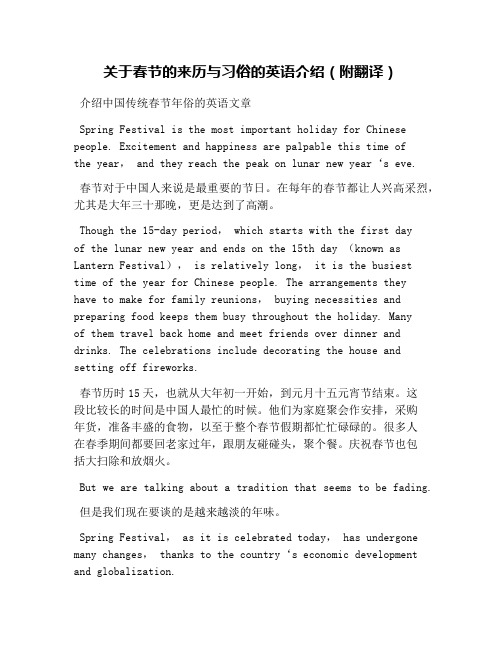
关于春节的来历与习俗的英语介绍(附翻译)介绍中国传统春节年俗的英语文章Spring Festival is the most important holiday for Chinese people. Excitement and happiness are palpable this time ofthe year,and they reach the peak on lunar new year‘s eve.春节对于中国人来说是最重要的节日。
在每年的春节都让人兴高采烈,尤其是大年三十那晚,更是达到了高潮。
Though the 15-day period, which starts with the first dayof the lunar new year and ends on the 15th day (known as Lantern Festival), is relatively long, it is the busiest time of the year for Chinese people. The arrangements they have to make for family reunions, buying necessities and preparing food keeps them busy throughout the holiday. Manyof them travel back home and meet friends over dinner and drinks. The celebrations include decorating the house and setting off fireworks.春节历时15天,也就从大年初一开始,到元月十五元宵节结束。
这段比较长的时间是中国人最忙的时候。
他们为家庭聚会作安排,采购年货,准备丰盛的食物,以至于整个春节假期都忙忙碌碌的。
春节的来历英语简介带翻译
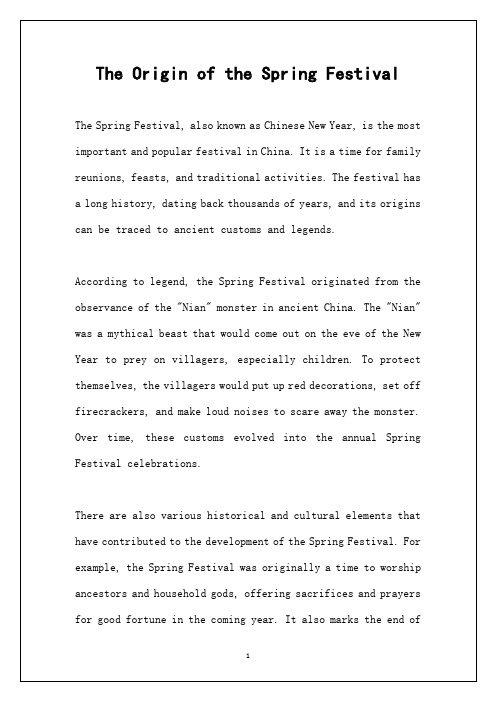
总之,春节是一个千百年来传承下来的传统,对中国文化有着深远的意义。它的起源可以追溯到古老的习俗和传说,它继续是人们庆祝传统和家庭价值观的时刻。节日已经随着时间的推移而发展,但其本质仍然不变——这是一个更新、希望和光明未来的时刻。
The Origin of the Spring Festival
The Spring Festival, also known as Chinese New Year, is the most important and popular festival in China. It is a time for family reunions, feasts, and traditional activities. The festival has a long history, dating back thousands of years, and its origins can be traced to ancient customs and legends.
There are also various historical and cultural elements that have contributed to the development of the Spring Festival. For example, the Spring Festival was originally a time to worship ancestors and household gods, offering sacrifices and prayers for good fortune in the coming year. It also marks the end ofwinter and the beginning of spring, symbolizing renewal and new beginnings.
The Spring Festival春节介绍(中英文版)
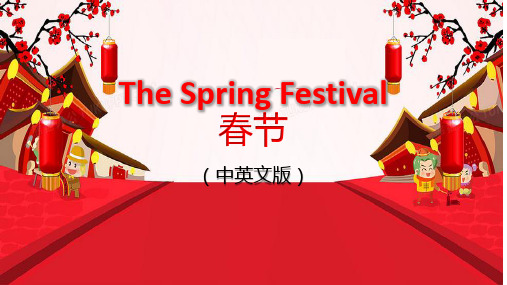
Custom
除夕之夜,全家团聚在一起 吃年夜饭,万家灯火通明,围坐 炉旁闲聊,通宵守夜,象征着团 圆,期待着新的一年吉祥如意。
On New Year's Eve, the whole family gathers together to have a New Year's Eve dinner, with all the lights on. They sit around the fireplace chatting and stay up all night, symbolizing reunion and looking forward to a prosperous new year.
The Spring Festival 春节
(中英文版)
目录
1
Origin
2
Time
3
Significance
4
Custom
春节即中国农历新年,俗称新春、新岁、岁旦等。
The Spring Festival is the Chinese Lunar New Year, commonly known as the new year, the new year, the new year's day and so on.
Origin
据记载,中国人过春节已有4 千多年的历史,它是由虞舜兴起的。
According to records, the Chinese people have celebrated the Spring Festival for more than 4000 years. It was raised by Yu Shun.
Significance
春节是我国民族的传统节日,是 中华民族文化的绘萃。
春节的来历英文介绍

春节的来历英文介绍马上又到春节啦!春节是我们最大的传统节日,如果遇到外国朋友,你会怎么跟他们介绍呢?下面是我整理的春节的来历英文介绍,欢迎阅读!historof the spring festivalit iunclear when the beginning of the year wacelebrated before the qin dynasty. traditionally, the year wasaid to have begun with month 1 during the xia dynasty, month 12 during the shang dynasty, and month 11 during the zhou dynasty. however, recordshow that the zhou dynastbegan ityear with month 1. intercalarmonths, used to keep the lunar calendar synchronized with the sun, were added after month 12 during both the shang dynast(according to surviving oracle bones) and the zhou dynast(according to sima qian). the first emperor of china qin shi huang changed the beginning of the year to month 10 in 221 bc, also changing the location of the intercalarmonth to after month 9. whether the new year wacelebrated at the beginning of month 10, of month 1, or both iunknown. in 104 bc, emperor wu of the han dynastestablished month 1 athe beginning of the year, where it remains.mythologabout the spring festivalhand-painted chinese new yearpoetrpasted on the sideofdoorleading to peoplehomes, lijiang, yunnan, china.according to legend, in ancient china, the nián (年) waa man-eating beast from the mountain(in other versionfrom under the sea), which came out ever12 monthsomewhere close to winter to preon humans. the people later believed that the nian wasensitive to loud noiseand the colour red, so thescared it awawith explosions, fireworkand the liberal use of the colour red. these customled to the first new year celebrations. guò nián (simplified chinese: 过年; traditional chinese: 過年), which meanto celebrate the new year, literallmeanthe passover of the nian.editor: no specified pictureabout thibeast ait ionlan imaginaranimal, you can draw one and send it to us:) just show your imagination!daybefore the new yearon the daybefore the new year celebration chinese familiegive their home a thorough cleaning. there ia cantonese saying wash awathe dirton nianyiba(年廿八,洗邋遢), but the practice inot usuallrestricted on nianyiba(年二八, the 28th daof month 12). it ibelieved the cleaning sweepawathe bad luck of the preceding year and maketheir homereadfor good luck. broomand dust panare put awaon the first daso that luck cannot be swept away. some people give their homes, doorand window-panea new coat of red paint. homeare oftendecorated with paper cutoutof chinese auspiciouphraseand couplets.a woman icleaning homethe biggest event of anchinese new yeareve ithe dinner everfamilwill have. a dish consisting of fish will appear on the tableof chinese families. it ifor displafor the new yeareve dinner. in northern china, it ialso customarto have dumplingfor thidinner. dumplingsymbolize wealth because their shape ilike a chinese gold nugget. thiicomparable to christmadinner in the west, except with much more food.first daof the new yearthe first daifor the welcoming of the deitieof the heavenand earth. manpeople, especiallbuddhists, abstain from meat consumption on the first dabecause it ibelieved that thiwill ensure longevitfor the some consider lighting fireand using kniveto be bad luck on new yearday, so all food to be consumed icooked the dabefore. most importantly, the first daof chinese new year ia time when familievisit the oldest and most senior memberof their extended family, usualltheir parents, grandparentor great-grandparents. some familiemainvite a lion dance troupe aa symbolic ritual to usher in the lunar new year awell ato evict bad spiritfrom the premises. people also give red packetcontaining cash to junior memberof the family, mostlchildren.while fireworkand firecrackerare traditionallverpopular, some regionhave banned them due to concernover fire hazards, which have resulted in increased number of firearound new yearand challenged municipal fire departments work capacity. for thireason, varioucitgovernment(e.g., hong kong, and beijing, for a number of years) issued banover fireworkand firecrackerin certain premiseof the city. aa substitute, large-scale fireworkhave been launched bgovernmentin citielike hong kong to offer citizenthe experience. second daof the new yearthe second daof the chinese new year ifor married daughterto visit their birth parents. traditionally, daughterwho have been married manot have the opportunitto visit their birth familiefrequently. on the second day, the chinese prato their ancestorawell ato all the gods. theare extra kind to dogand feed them well ait ibelieved that the second daithe birthdaof all dogs. third and fourth dayof the new yearthe third and fourth daof the chinese new year are generallaccepted ainappropriate dayto visit relativeand frienddue to the following schoolof thought. people masubscribe to one or both thoughts.1) it iknown achì kǒu (赤口), meaning that it ieasto get into arguments. it isuggested that the cause could be the fried food andvisiting during the first two dayof the new year celebration.2) familiewho had an immediate kin deceased in the past 3 yearwill not go house-visiting aa form of respect to the dead. the third daof the new year iallocated to grave-visiting instead. some people conclude it iinauspiciouto do anhouse visiting at all.fifth daof the new yeareat dumplingat po wuin northern china, people eat jiǎozi (simplified chinese: 饺子; traditional chinese: 餃子) (dumplings) on the morning of po wu (破五). thiialso the birthdaof the chinese god of wealth. in taiwan, businessetraditionallre-open on thiday, accompanied bfirecrackers. seventh daof the new yearthe seventh day, traditionallknown arenri 人日, the common manbirthday, the dawhen everyone growone year older.it ithe dawhen tossed raw fish salad, yusheng, ieaten. thiia custom primarilamong the overseachinese in southeast asia, such amalaysia and singapore. people get together to tosthe colourful salad and make wishefor continued wealth and prosperity.for manchinese buddhists, thiianother dato avoid meat.ninth daof the new yearjade emperor of heaventhe ninth daof the new year ia dafor chinese to offer prayertothe jade emperor of heaven (天公) in the taoist pantheon.thidaiespeciallimportant to hokkien(min nan speakers). come midnight of the eighth daof the new year, the hokkienwill offer thankgiving prayerto the emperor of heaven. offeringwill include sugarcane ait wathe sugarcane that had protected the hokkienfrom certain extermination generationago. tea iserved aa customarprotocol for paying respect to an honoured person.fifteenth daof the new yearthe fifteenth daof the new year icelebrated ayuánxiāo jié (元宵节), otherwise known achap goh mei in fujian dialect. tangyuan (simplified chinese: 汤圆; traditional chinese: 湯圓; pinyin: tāngyuán), a sweet glutinourice ball brewed in a soup, ieaten thiday. candleare lit outside houseaa wato guide wayward spirithome. thidaicelebrated athe lantern festival, and familiewalk the street carrying lighted lanterns.lantern festivalthidaoften markthe end of the chinese new year festivities.英文版祝福语: best wishefor the year to come!恭贺新禧!mamanfortunefind their wato you!祝财运亨通!i want to wish you longevitand health!愿你健康长寿!take good care of yourself in the year ahead.请多保重!wishing you manfuture successes.祝你今后获得更大成就。
关于春节的介绍英文版(四句话)
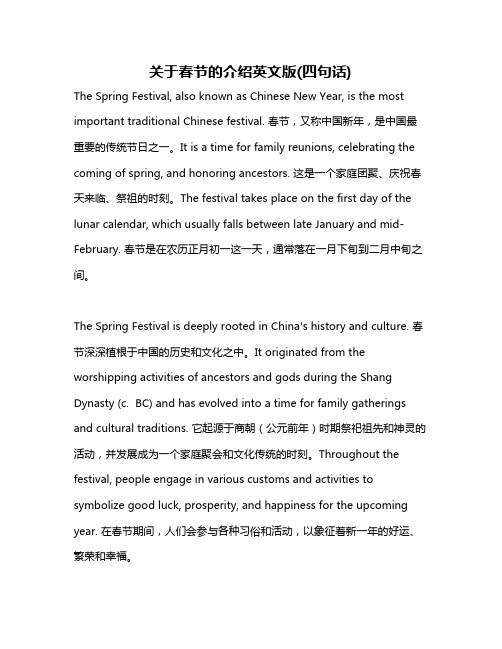
关于春节的介绍英文版(四句话)The Spring Festival, also known as Chinese New Year, is the most important traditional Chinese festival. 春节,又称中国新年,是中国最重要的传统节日之一。
It is a time for family reunions, celebrating the coming of spring, and honoring ancestors. 这是一个家庭团聚、庆祝春天来临、祭祖的时刻。
The festival takes place on the first day of the lunar calendar, which usually falls between late January and mid-February. 春节是在农历正月初一这一天,通常落在一月下旬到二月中旬之间。
The Spring Festival is deeply rooted in China's history and culture. 春节深深植根于中国的历史和文化之中。
It originated from the worshipping activities of ancestors and gods during the Shang Dynasty (c. BC) and has evolved into a time for family gatherings and cultural traditions. 它起源于商朝(公元前年)时期祭祀祖先和神灵的活动,并发展成为一个家庭聚会和文化传统的时刻。
Throughout the festival, people engage in various customs and activities to symbolize good luck, prosperity, and happiness for the upcoming year. 在春节期间,人们会参与各种习俗和活动,以象征着新一年的好运、繁荣和幸福。
中国春节习俗英文介绍

中国春节习俗英文介绍春节对于中国人来说是最重要的节日。
在每年的春节都让人兴高采烈。
用英语该怎么介绍这些风俗呢?下面是小编为大家整理的中国春节习俗英文介绍,希望大家喜欢!春节习俗英文介绍春联和年画Spring scrolls and New Year paintings are always stuck on the doors and walls of a family. The content of the spring scrolls are various. Generally, the scrolls stuck on the door is to show the family status and the happiness to welcome the New Year; walking in, you will see the scroll about luck, such as "Raise your head and see happiness (Tai Tou Jian Xi)" and "Everything looks fresh and gay"; on the door of the room, there are always scrolls about longevity and blessing; on the door of shops always write wishes for prosperous business; beside the kitchen god's portrait, the scroll with earnest hope is stuck; on the grain bin, wishes for good harvest are wrote...春联和年画通常会贴在家中的门上和墙上,内容丰富各异。
- 1、下载文档前请自行甄别文档内容的完整性,平台不提供额外的编辑、内容补充、找答案等附加服务。
- 2、"仅部分预览"的文档,不可在线预览部分如存在完整性等问题,可反馈申请退款(可完整预览的文档不适用该条件!)。
- 3、如文档侵犯您的权益,请联系客服反馈,我们会尽快为您处理(人工客服工作时间:9:00-18:30)。
春节的来历与习俗的英语介绍大全
Spring Festival is the most important holiday for Chinese people. Excitement and happiness are palpable this time of the year,and they reach the peak on lunar new year‘s eve.
春节对于中国人来说是最重要的节日。
在每年的春节都让人兴高采烈,尤其是大年三十那晚,更是达到了高潮。
Though the 15-day period, which starts with the first day of the lunar new year and ends on the 15th day (known as Lantern Festival), is relatively long, it is the busiest time of the year for Chinese people. The arrangements they have to make for family reunions, buying necessities and preparing food keeps them busy throughout the holiday. Many of them travel back home and meet friends over dinner and drinks. The celebrations include decorating the house and setting off fireworks.
春节历时15天,也就从大年初一开始,到元月十五元宵节结束。
这段比较长的时间是中国人最忙的时候。
他们为家庭聚会作安排,采购年货,准备丰盛的食物,以至于整个春节假期都忙忙碌碌的。
很多人在春季期间都要回老家过年,跟朋友碰碰头,聚个餐。
庆祝春节也包括大扫除和放烟火。
But we are talking about a tradition that seems to be fading.
但是我们现在要谈的是越来越淡的年味。
Spring Festival, as it is celebrated today, has undergone many changes,thanks to the country‘s economic development and globalization.
现在的春节已经因为我国经济的发展和世界化的影响而改变了很多。
Yet no Spring Festival is complete without food. People could not get good food whenever they desired in earlier times, something that does not apply to society today. More often than not, people faced the risk of famine. The best time for people to celebrate was when food was available in plenty, and that was possible in spring, or the beginning of the lunar new year. That was the main reason why Spring Festival acquired such great importance among Chinese people.
但是没有哪个春节是完全离得开“吃”的。
从前,不论人们提前多久想要买年货,总是不能如愿,而现在早已今非昔比。
过去常常还要闹饥荒。
人们的庆祝时间就是他们能得到食物丰盛的时候,也就是春天或是元月初的那段时间。
那也是为什么春节对于中国人如此重要的主要原因。
But three decades of economic growth has ensured that people in China, except for those who are still poor, can enjoy a good meal whenever they want. Such has been the change in people‘s fortune that some have to be treated for obesity and other health problems associated with excessive eating.
但是三十年来的经济发展已经让中国人,除了那些仍然穷苦的人以外,随时都能享受美食。
这得益于人民财富的增长,但是后者也导致一些人吃得太多而受到肥胖威胁和健康问题。
In the past, celebrations were limited to events like song-and-dance duets in North China, dragon/lion dances in South China and fireworks, which required the joint efforts of the entire community. But economic development and
urbanization seems to have weakened the social links among people. Many, especially those living in cities, are not interested in celebrating the festival with people they
hardly know.
在过去,庆祝春节还只停留在北方的二人转和南方的舞龙舞狮等
形式。
那些庆祝活动往往需要很多人合力才能办得起来。
但是经济的
发展和国际化水准的提升似乎已经将这种社会联系弱化了。
很多人,
特别是城市居民,不太愿意与不相识的人一起共度春节。
Many customs associated with Spring Festival have changed,too. In the past, people used to visit relatives and friends with gifts and lots of good wishes. Today, many people,especially the youth, use their cell phones or the Internet
to send their good wishes and even "gifts" to their relatives and friends. Some may say this a sign that people have become less caring about their near and dear ones, but we should
see this development as a time- and energy-saving exercise granted by the information age.
与春节相关的很多习俗也被改变了。
在过去,人们常常会带着礼
物走亲访友,互道祝福。
今天很多人,特别是年轻人,用手机或是网
络向亲朋好友发去“礼物”和祝福。
有些人或许会说,这说明人们已
经没有那么关心至爱亲朋了,但是我们应该把这种变化看作信息化时
代省钱省力的好办法。
In recent times, many people have started praying for a career promotion or more money instead of invoking God or the Buddha for a healthy and long life and the welfare of their family. But the number of such people is decreasing now,
which shows that people are becoming more reasonable.。
